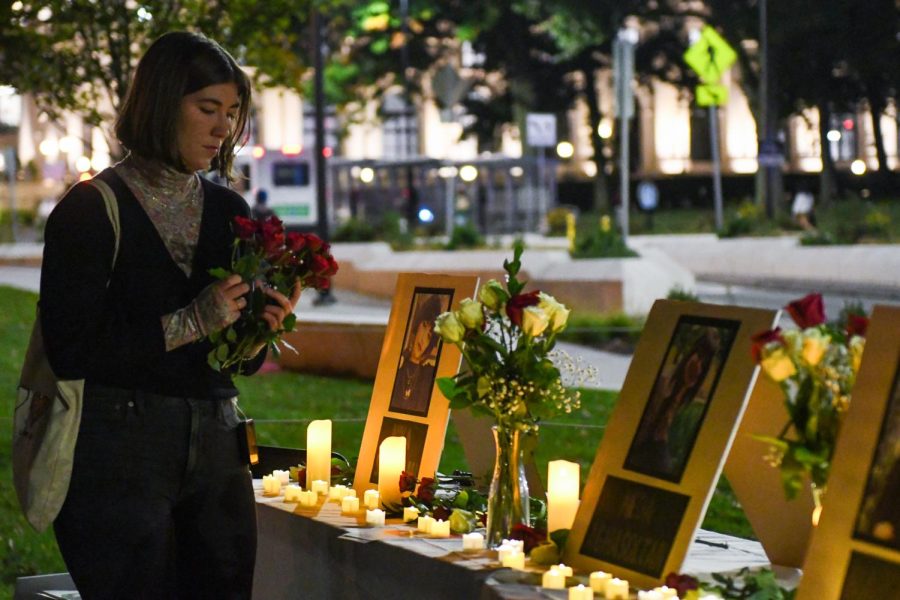More than 100 student leaders release letter urging Pitt for an official statement on situation in Iran
A student leaves flowers at a candlelight vigil for Mahsa Amini and other victims of the Iranian “morality police” outside the William Pitt Union last Tuesday evening.
October 21, 2022
The Middle Eastern North African Student Association sent a letter to Chancellor Patrick Gallagher Thursday afternoon urging Pitt to release an official statement on the “ongoing atrocities in Iran and the Iranian fight for freedom.”
“Pitt must utilize its influence and power as a global University focused on ‘making lives better for people everywhere’ to amplify the voices of Iranian women as they fight for freedom and must continue to do so in future humanitarian issues as well,” the letter said.
According to University spokesperson Jared Stonesifer, Pitt received the letter and senior leaders at the University are currently reviewing it. The spokesperson also noted that Pitt reached out to the Iranian community on campus “to offer support and resources.”
The letter comes as political tensions continue to rise in Iran following the death of 22-year-old Mahsa Amini who was beaten and killed by the Iranian “morality police” for allegedly wearing “improper hijab.” Following Amini’s death, thousands of Iranians, primarily women and students, protested the Iranian government and were met with violence and arrests from the Iranian police.
People around the world have also protested and held rallies in solidarity with the Iranian people, including a candlelight vigil at Pitt earlier this month that mourned the death of Amini and other women killed by the “morality police.”
Kinan Moukamal, co-president of MENASA, said the organization wrote the letter because they were “tired of people, especially leaders in education, ignoring issues coming from the Middle East.”
“This comes partly from people tending to think that violence and war are just what life is like for us. What is happening to Iranians, especially women and youth, is unsanctioned violence and a clear violation of human rights,” Moukamal said. “This is not an argument, it’s a fact. There is no other way to describe this brutality and it is crucial that we use our voices to stand with them as they fight for freedom.”
The letter, which 115 student leaders initially signed and now has more than 300 signatures across various methods, including an online petition, includes a list of demands, such as providing an application waiver fee to Iranians who are applying to Pitt from Iran and may be facing economic hardship and extend the application deadline for Iranian applicants who may have had their application process and testing delayed as a result of internet blackouts in the country.
The letter also demands that Pitt provide mental health services to students and faculty who are affected by the political state of Iran and to start collecting data on the number of students who identify as Middle Eastern and North African as they are “left out” of diversity statistics and consequently research on disparities the Pitt community faces.
Moukamal, a senior computer science and linguistics major, said it often feels as though only Western issues get acknowledged on campus and for minority students at a predominantly white institution it can already feel like they are “not as welcomed.”
“Any institution that teaches democratic values and takes pride in being a global leader has a direct responsibility to support freedom everywhere and speak against injustice everywhere,” Moukamal said. “We can’t pick and choose which conflicts are controversial or not, we can’t pick and choose which people matter more, and we can’t pick and choose when we should care enough to help people who need it.”
Elyanna Sharbaji, co-president of MENASA and junior psychology and political science major, said as a Syrian American who has experienced similar “pain and violence,” she understands the importance of making Iranian people “feel heard and supported.”
“I know what it is like when you think your voice isn’t heard and no one cares about what is happening in your country and to your people,” Sharbaji said. “Therefore, it is important to me to speak up for Iranians as there are many Iranaians who can’t speak up for themselves due to threats and danger by their own regime.”
According to Moukamal, Iranians deserve support during this time especially given that they make up the fifth largest international student group on campus.
“As a highly renowned academic institution, Pitt has the responsibility to speak out against human rights violations and support the women-led movement for freedom in Iran,” Moukamal said. “It’s time for Pitt to say Zan Zendegi Azadi: Women, Life, Freedom.”








